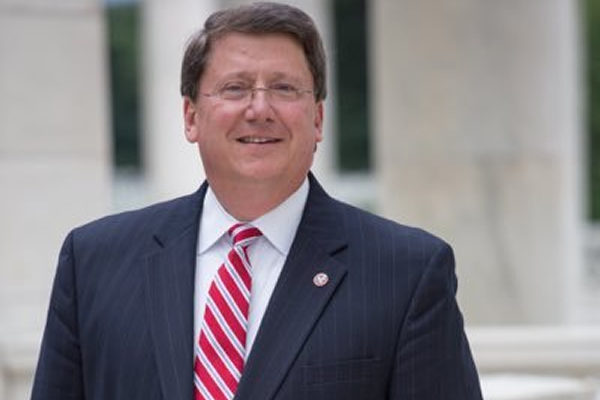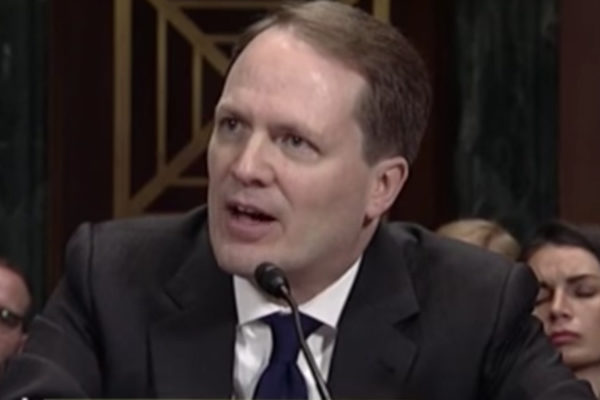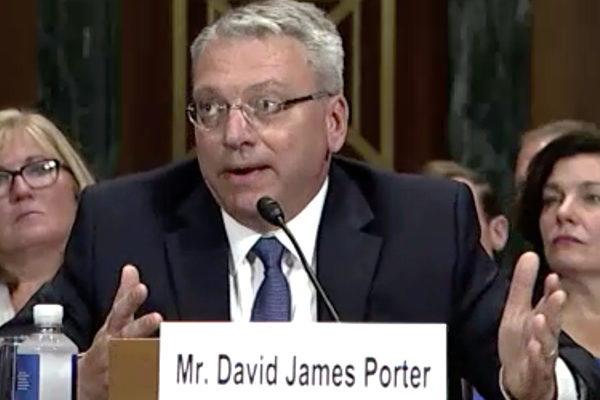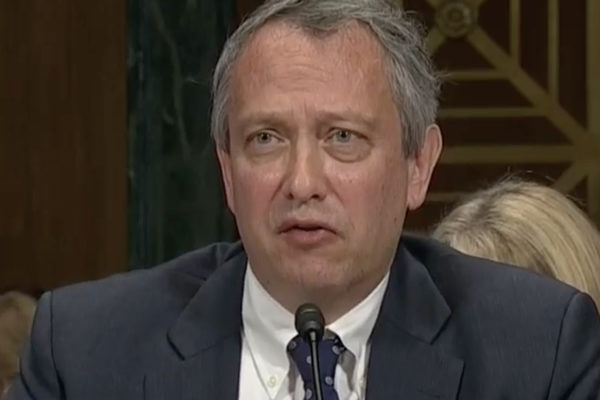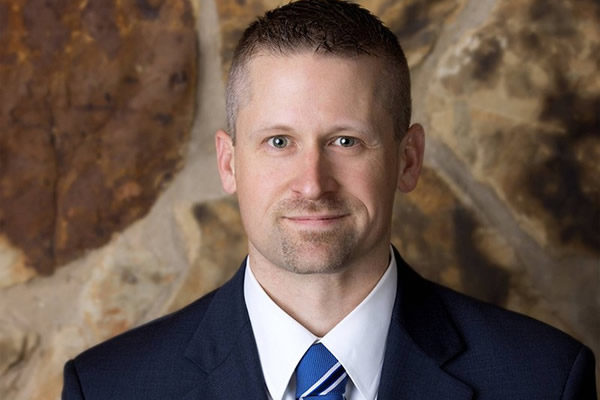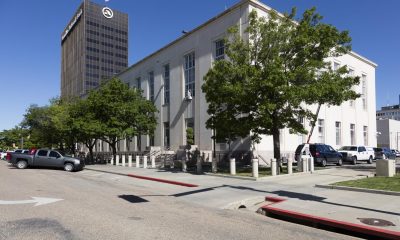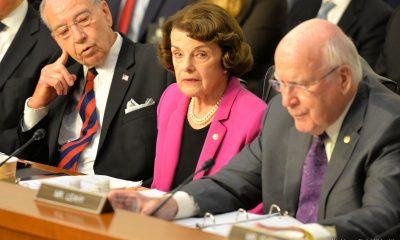homepage news
McConnell wants to confirm these anti-LGBT judges
Senators to skip August recess to vote on Trump picks
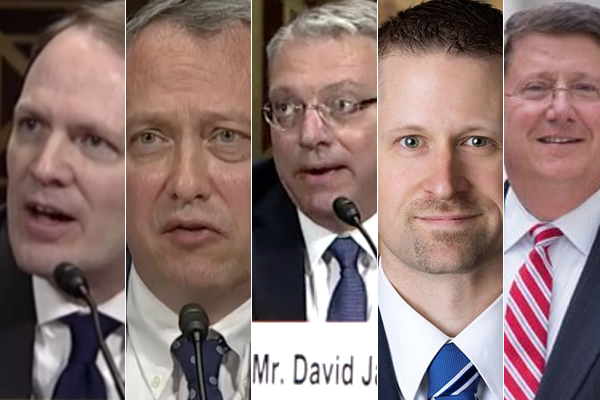
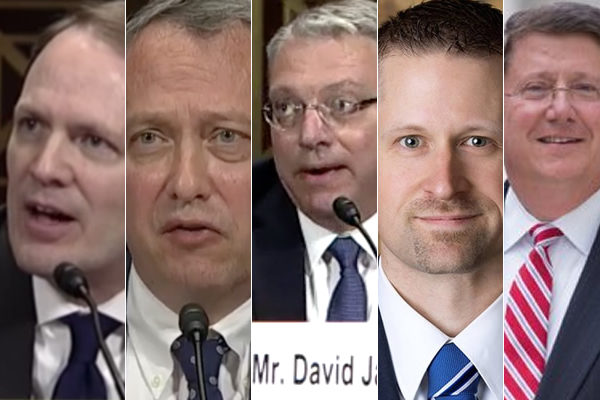
The Senate may soon confirm these Trump judicial nominees who are a threat to LGBT rights. From left, Howard Nielson, Thomas Alvin Farr, David Porter, Matthew Kacsmaryk and Mark Norris. (Screen captures of Neilsen, Farr and Porter public domain; First Liberty Institute publicity photo of Kacsmaryk; photo of Norris via Twitter)
With August fast approaching, U.S. Senators would customarily leave Washington for their annual break, but Senate Majority Leader Mitch McConnell is holding them in session for votes on President Trump’s judicial nominees — many of whom would likely threaten LGBT rights if confirmed.
The Washington Blade has highlighted five nominees that could come up for a vote and that the LGBT legal group Lambda Legal and other progressive groups have identified as hostile to LGBT rights.
Each of these nominees could receive a vote at the same time the Senate considers the nomination of Brett Kavanaugh, whom Trump has named for a seat on the U.S. Supreme Court and whom LGBT groups oppose because he came from a list of potential picks created by the anti-LGBT Heritage Foundation.
Trump named many of these picks as long as a year ago, but they have languished in the Senate as a result of opposition from civil rights groups over their records and views against LGBT rights.
Here’s background on the five nominees and their anti-LGBT records:
Mark Norris, nominated for a seat on the U.S. District Court for the Northern District of Tennessee
Nominated by Trump in July 2017, Norris has served for 17 years as a member of the Tennessee Senate, where he has supported anti-LGBT legislation and shepherded it through as Senate majority leader.
Among the anti-LGBT bills Norris supported and are now law are measures prohibiting Tennessee municipalities from enacting pro-LGBT ordinances and enabling mental health counselors to refuse to treat LGBT patients out of religious objections.
Norris as majority leader also last year moved through legislation now pending before the House that would bar the government from taking “discriminatory action” against a business based on its internal policies. The measure would bar cities from refusing to contract with companies that have no policies against anti-LGBT discrimination.
After the U.S. Supreme Court ruled in 2015 in favor of same-sex marriage nationwide, Norris challenged the legitimacy of the decision.
In September 2016, Norris was among 53 Republican legislators who filed a motion to intervene in a custody dispute case between two lesbian parents. The lawmakers argued the lesbian parent who wasn’t the birth mother didn’t have rights to her child because the Obergefell decision didn’t apply to family law.
In the final year of the Obama administration, Norris was a critic of guidance requiring schools to allow transgender students to use the bathroom consistent with their gender identity, pledging in a statement to “make sure that nothing will be done to give this ‘guidance’ any effect.” Trump has since repealed the guidance.
But Norris’ record isn’t just marked by anti-LGBT views. The lawmaker has pushed forward other initiatives criticized by civil rights groups. Among those measures are anti-Muslim legislation, English-only driver’s education, measures restricting abortion rights, legislation enhancing criminal penalties on undocumented immigrants and a voter ID law seen to block minorities from accessing the polls.
Howard Nielson, nominated for a seat on the U.S. District Court for the District of Utah
Howard Nielson made defense of California’s Proposition 8 in court — and the argument that U.S. Chief Judge Vaughn Walker’s ruling against the measure should be invalidated because the judge didn’t disclose he’s gay — a distinctive part of his legal career.
Nominated by Trump in September 2017, Nielson is a partner at the D.C.-based Cooper & Kirk, PLLC and represented the defendants in Hollingsworth v. Perry, who sought to uphold the measure banning same-sex marriage in California they placed on the ballot in 2008. The U.S. Supreme Court ultimately rejected their claims on the basis they didn’t have standing in court, restoring marriage equality to California.
But before that ruling, Nielson filed a motion seeking to vacate Walker’s ruling against Proposition 8 on the basis that he was in same-sex relationship and didn’t disclose that as he adjudicated the case.
“Chief Judge Walker thus had a duty to disclose not only the facts concerning his relationship, but also his marriage intentions, for the parties (and the public) were entitled to know whether his waivable conflict was actually a non-waivable conflict mandating his disqualification,” Nielson wrote.
Nielson’s attempt to invalidate Walker’s ruling was rejected by U.S. District Judge James Ware, who sided with pro-gay rights groups in maintaining Walker’s sexual orientation shouldn’t invalidate his decision.
In his argument in favor of Proposition 8 on its merits, Nielson suggested being gay is a choice by pointing out there is debate about how sexual orientation is defined and disputed the effect of discrimination on gay people, including increased rates of depression and suicide.
Nielson has also faced criticism for being part of the screening committee at the U.S. Justice Department during the Bush administration, which was found to have taken political affiliation into account for hiring practices. He also worked at the Office of Legal Counsel, which justified the use of torture. Nielson has also been an attorney for the National Rifle Association.
David Porter, nominated for a seat on the U.S. Third Circuit Court of Appeals
Nominated by Trump in 2018, Porter could be one of the first nominees McConnell brings up for a vote because circuit court nominees will likely be a high priority.
Porter — a partner at the Pittsburgh-based Buchanan Ingersoll & Rooney — has an anti-LGBT record that has raised concerns as a result of his association with groups and politicians who’ve expressed anti-LGBT views.
Porter leads the Lawyers Chapter of the Pittsburgh Federalist Society, a conservative legal group that argues for strict interpretation of the U.S. Constitution. In 2009, Porter co-founded the Pennsylvania Judicial Network, a group that opposed the confirmation of now U.S. Associate Justice Sonia Sotomayor, with former U.S. Sen. Rick Santorum, who has expressed notoriously anti-LGBT views.
Also of concern to LGBT groups is Porter’s opposition to the Affordable Care Act. In a 2012 article, Porter argued if the U.S. Supreme Court were to uphold Obamacare under the Commerce Clause, it would “break the Framers’ structural design.”
The process by which the Senate has advanced Porter has also raised concern. The Third Seat was open during the Obama administration, but wasn’t filled because the Senate didn’t take action after Sen. Pat Toomey (R-Pa.) refused to turn in his “blue slip” for the nominee Obama selected. The Senate has traditionally used the “blue slip” process to give deference to home state senators in the judicial nomination process.
Now, during the Trump administration, the other senator from Pennsylvania, Bob Casey (D), has refused to hand in his “blue slip” for Porter. Instead of his respecting Casey’s wishes to hold on the nominees as was done with Toomey, Senate Judiciary Committee Chair Charles Grassley (R-Iowa) has proceeded with the Porter nomination and gave him a hearing. The committee reported Porter out favorably to the Senate floor, where he awaits a confirmation vote.
Thomas Alvin Farr, nominated for a seat on the U.S. District Court for the Eastern District of North Carolina
Farr has faced criticism from LGBT groups because of the larger progressive coalition’s concern over his defense of policies seen to target minority groups, such as a North Carolina gerrymandering law seen to block black voters from being heard in the political process.
A shareholder in the Raleigh office of Ogletree, Deakins, Nash, Smoak & Stewart PC, Farr unsuccessfully represented the Republican-led North Carolina Legislature in defense of the state’s redistricting after the 2010 Census. The U.S. Fourth Circuit Court of Appeals concluded the state engaged in gerrymandering and sought to “target African-Americans with almost surgical precision.”
Farr defended a company when a supervisor said that “women with children should be at home and not employed in the workplace.” In 1998, he defended Avis against charges it was refusing to rent cars to black customers under the same conditions afforded to white customers. A staff attorney at the National Right to Work Legal Defense Foundation, Farr has also sought to undermine unionization efforts.
As legal counsel for the 1990 campaign of the late Sen. Jesse Helms, Farr faced scrutiny over efforts to intimidate black voters by distributing flyers in their neighborhoods falsely telling them they could be prosecuted for voting. Farr denied being part of the effort, but a Justice Department attorney familiar with the effort insisted he was involved.
The seat to which Farr was nominated has been open since 2005 — making it the oldest judicial vacancy in the country — and represents a 30 percent African-American district.
Former President Obama nominated for the seat former North Carolina Supreme Court Justice Patricia Timmons-Goodson, who’s black, but U.S. Sen. Richard Burr (R-N.C.) blocked the nomination as part of the “blue slip” process. Farr, who’s white, was initially nominated by former President George W. Bush and Trump renominated him in July 2017.
Matthew Kacsmaryk, nominated for a seat on the U.S. District Court in the Northern District of Texas
Nominated by Trump in September 2017, Kacsmaryk has rejected LGBT rights as deputy general counsel to the First Liberty Institute, which advocates for enabling anti-LGBT discrimination in the name of “religious freedom.”
Kacsmaryk has defined the LGBT rights struggle as a “clash of absolutes” between “religious liberty and sexual liberty,” opposing advancements in LGBT rights on many fronts at the federal and state level.
In response to the U.S. Supreme Court decision in favor of same-sex marriage nationwide, Kacsmaryk said the ruling found an “unwritten” right under the Fourteenth Amendment that was “a secret knowledge so cleverly concealed in the nineteenth century amendment that it took almost 150 years to find.”
When Rowan County Clerk Kim Davis refused to grant marriage licenses to same-sex couples, Kacsmaryk defended her, comparing her actions to that of “pacifistic Quakers” who refused fight in war and“Jewish butchers” who follow kosher dietary laws.
After the U.S. Equal Employment Opportunity Commission ruled in 2015 the prohibition on sex discrimination applies to cases of anti-gay discrimination, Kacsmaryk told The World, an outlet that reports on religious freedom, the decision was the latest in efforts to undermine marriage law.
“Traditionally and legally, we define sex according to chromosomes…That’s typically how we define sex,” Kacsmaryk said. “That’s how we ordered our marriage laws and made certain presumptions of paternity in the family code. All of that is cast into disarray if you declare sex irrelevant to marriage.”
When the Obama administration issued a rule interpreting the prohibition of sex discrimination under the Affordable Care Act to apply to transgender people, Kacsmaryk opposed the regulation and called it “radical self-definition and sex-actualization.”
Kacsmaryk also endorsed the sweeping Mississippi “religious freedom” law known as HB 1523, which enables businesses and individuals to refuse service to LGBT people and medical practitioners to deny transition-related care to transgender patients.
Editor’s Note: The Blade relied on research from Alliance for Justice as well as other sources for the basis of this reporting.
homepage news
Honoring the legacy of New Orleans’ 1973 UpStairs Lounge fire
Why the arson attack that killed 32 gay men still resonates 50 years later

On June 23 of last year, I held the microphone as a gay man in the New Orleans City Council Chamber and related a lost piece of queer history to the seven council members. I told this story to disabuse all New Orleanians of the notion that silence and accommodation, in the face of institutional and official failures, are a path to healing.
The story I related to them began on a typical Sunday night at a second-story bar on the fringe of New Orleans’ French Quarter in 1973, where working-class men would gather around a white baby grand piano and belt out the lyrics to a song that was the anthem of their hidden community, “United We Stand” by the Brotherhood of Man.
“United we stand,” the men would sing together, “divided we fall” — the words epitomizing the ethos of their beloved UpStairs Lounge bar, an egalitarian free space that served as a forerunner to today’s queer safe havens.
Around that piano in the 1970s Deep South, gays and lesbians, white and Black queens, Christians and non-Christians, and even early gender minorities could cast aside the racism, sexism, and homophobia of the times to find acceptance and companionship for a moment.
For regulars, the UpStairs Lounge was a miracle, a small pocket of acceptance in a broader world where their very identities were illegal.
On the Sunday night of June 24, 1973, their voices were silenced in a murderous act of arson that claimed 32 lives and still stands as the deadliest fire in New Orleans history — and the worst mass killing of gays in 20th century America.
As 13 fire companies struggled to douse the inferno, police refused to question the chief suspect, even though gay witnesses identified and brought the soot-covered man to officers idly standing by. This suspect, an internally conflicted gay-for-pay sex worker named Rodger Dale Nunez, had been ejected from the UpStairs Lounge screaming the word “burn” minutes before, but New Orleans police rebuffed the testimony of fire survivors on the street and allowed Nunez to disappear.
As the fire raged, police denigrated the deceased to reporters on the street: “Some thieves hung out there, and you know this was a queer bar.”
For days afterward, the carnage met with official silence. With no local gay political leaders willing to step forward, national Gay Liberation-era figures like Rev. Troy Perry of the Metropolitan Community Church flew in to “help our bereaved brothers and sisters” — and shatter officialdom’s code of silence.
Perry broke local taboos by holding a press conference as an openly gay man. “It’s high time that you people, in New Orleans, Louisiana, got the message and joined the rest of the Union,” Perry said.
Two days later, on June 26, 1973, as families hesitated to step forward to identify their kin in the morgue, UpStairs Lounge owner Phil Esteve stood in his badly charred bar, the air still foul with death. He rebuffed attempts by Perry to turn the fire into a call for visibility and progress for homosexuals.
“This fire had very little to do with the gay movement or with anything gay,” Esteve told a reporter from The Philadelphia Inquirer. “I do not want my bar or this tragedy to be used to further any of their causes.”
Conspicuously, no photos of Esteve appeared in coverage of the UpStairs Lounge fire or its aftermath — and the bar owner also remained silent as he witnessed police looting the ashes of his business.
“Phil said the cash register, juke box, cigarette machine and some wallets had money removed,” recounted Esteve’s friend Bob McAnear, a former U.S. Customs officer. “Phil wouldn’t report it because, if he did, police would never allow him to operate a bar in New Orleans again.”
The next day, gay bar owners, incensed at declining gay bar traffic amid an atmosphere of anxiety, confronted Perry at a clandestine meeting. “How dare you hold your damn news conferences!” one business owner shouted.
Ignoring calls for gay self-censorship, Perry held a 250-person memorial for the fire victims the following Sunday, July 1, culminating in mourners defiantly marching out the front door of a French Quarter church into waiting news cameras. “Reverend Troy Perry awoke several sleeping giants, me being one of them,” recalled Charlene Schneider, a lesbian activist who walked out of that front door with Perry.

Esteve doubted the UpStairs Lounge story’s capacity to rouse gay political fervor. As the coroner buried four of his former patrons anonymously on the edge of town, Esteve quietly collected at least $25,000 in fire insurance proceeds. Less than a year later, he used the money to open another gay bar called the Post Office, where patrons of the UpStairs Lounge — some with visible burn scars — gathered but were discouraged from singing “United We Stand.”
New Orleans cops neglected to question the chief arson suspect and closed the investigation without answers in late August 1973. Gay elites in the city’s power structure began gaslighting the mourners who marched with Perry into the news cameras, casting suspicion on their memories and re-characterizing their moment of liberation as a stunt.
When a local gay journalist asked in April 1977, “Where are the gay activists in New Orleans?,” Esteve responded that there were none, because none were needed. “We don’t feel we’re discriminated against,” Esteve said. “New Orleans gays are different from gays anywhere else… Perhaps there is some correlation between the amount of gay activism in other cities and the degree of police harassment.”

An attitude of nihilism and disavowal descended upon the memory of the UpStairs Lounge victims, goaded by Esteve and fellow gay entrepreneurs who earned their keep via gay patrons drowning their sorrows each night instead of protesting the injustices that kept them drinking.
Into the 1980s, the story of the UpStairs Lounge all but vanished from conversation — with the exception of a few sanctuaries for gay political debate such as the local lesbian bar Charlene’s, run by the activist Charlene Schneider.
By 1988, the 15th anniversary of the fire, the UpStairs Lounge narrative comprised little more than a call for better fire codes and indoor sprinklers. UpStairs Lounge survivor Stewart Butler summed it up: “A tragedy that, as far as I know, no good came of.”
Finally, in 1991, at Stewart Butler and Charlene Schneider’s nudging, the UpStairs Lounge story became aligned with the crusade of liberated gays and lesbians seeking equal rights in Louisiana. The halls of power responded with intermittent progress. The New Orleans City Council, horrified by the story but not yet ready to take its look in the mirror, enacted an anti-discrimination ordinance protecting gays and lesbians in housing, employment, and public accommodations that Dec. 12 — more than 18 years after the fire.
“I believe the fire was the catalyst for the anger to bring us all to the table,” Schneider told The Times-Picayune, a tacit rebuke to Esteve’s strategy of silent accommodation. Even Esteve seemed to change his stance with time, granting a full interview with the first UpStairs Lounge scholar Johnny Townsend sometime around 1989.
Most of the figures in this historic tale are now deceased. What’s left is an enduring story that refused to go gently. The story now echoes around the world — a musical about the UpStairs Lounge fire recently played in Tokyo, translating the gay underworld of the 1973 French Quarter for Japanese audiences.
When I finished my presentation to the City Council last June, I looked up to see the seven council members in tears. Unanimously, they approved a resolution acknowledging the historic failures of city leaders in the wake of the UpStairs Lounge fire.
Council members personally apologized to UpStairs Lounge families and survivors seated in the chamber in a symbolic act that, though it could not bring back those who died, still mattered greatly to those whose pain had been denied, leaving them to grieve alone. At long last, official silence and indifference gave way to heartfelt words of healing.
The way Americans remember the past is an active, ongoing process. Our collective memory is malleable, but it matters because it speaks volumes about our maturity as a people, how we acknowledge the past’s influence in our lives, and how it shapes the examples we set for our youth. Do we grapple with difficult truths, or do we duck accountability by defaulting to nostalgia and bluster? Or worse, do we simply ignore the past until it fades into a black hole of ignorance and indifference?
I believe that a factual retelling of the UpStairs Lounge tragedy — and how, 50 years onward, it became known internationally — resonates beyond our current divides. It reminds queer and non-queer Americans that ignoring the past holds back the present, and that silence is no cure for what ails a participatory nation.
Silence isolates. Silence gaslights and shrouds. It preserves the power structures that scapegoat the disempowered.
Solidarity, on the other hand, unites. Solidarity illuminates a path forward together. Above all, solidarity transforms the downtrodden into a resounding chorus of citizens — in the spirit of voices who once gathered ‘round a white baby grand piano and sang, joyfully and loudly, “United We Stand.”

Robert W. Fieseler is a New Orleans-based journalist and the author of “Tinderbox: the Untold Story of the Up Stairs Lounge Fire and the Rise of Gay Liberation.”
homepage news
New Supreme Court term includes critical LGBTQ case with ‘terrifying’ consequences
Business owner seeks to decline services for same-sex weddings

The U.S. Supreme Court, after a decision overturning Roe v. Wade that still leaves many reeling, is starting a new term with justices slated to revisit the issue of LGBTQ rights.
In 303 Creative v. Elenis, the court will return to the issue of whether or not providers of custom-made goods can refuse service to LGBTQ customers on First Amendment grounds. In this case, the business owner is Lorie Smith, a website designer in Colorado who wants to opt out of providing her graphic design services for same-sex weddings despite the civil rights law in her state.
Jennifer Pizer, acting chief legal officer of Lambda Legal, said in an interview with the Blade, “it’s not too much to say an immeasurably huge amount is at stake” for LGBTQ people depending on the outcome of the case.
“This contrived idea that making custom goods, or offering a custom service, somehow tacitly conveys an endorsement of the person — if that were to be accepted, that would be a profound change in the law,” Pizer said. “And the stakes are very high because there are no practical, obvious, principled ways to limit that kind of an exception, and if the law isn’t clear in this regard, then the people who are at risk of experiencing discrimination have no security, no effective protection by having a non-discrimination laws, because at any moment, as one makes their way through the commercial marketplace, you don’t know whether a particular business person is going to refuse to serve you.”
The upcoming arguments and decision in the 303 Creative case mark a return to LGBTQ rights for the Supreme Court, which had no lawsuit to directly address the issue in its previous term, although many argued the Dobbs decision put LGBTQ rights in peril and threatened access to abortion for LGBTQ people.
And yet, the 303 Creative case is similar to other cases the Supreme Court has previously heard on the providers of services seeking the right to deny services based on First Amendment grounds, such as Masterpiece Cakeshop and Fulton v. City of Philadelphia. In both of those cases, however, the court issued narrow rulings on the facts of litigation, declining to issue sweeping rulings either upholding non-discrimination principles or First Amendment exemptions.
Pizer, who signed one of the friend-of-the-court briefs in opposition to 303 Creative, said the case is “similar in the goals” of the Masterpiece Cakeshop litigation on the basis they both seek exemptions to the same non-discrimination law that governs their business, the Colorado Anti-Discrimination Act, or CADA, and seek “to further the social and political argument that they should be free to refuse same-sex couples or LGBTQ people in particular.”
“So there’s the legal goal, and it connects to the social and political goals and in that sense, it’s the same as Masterpiece,” Pizer said. “And so there are multiple problems with it again, as a legal matter, but also as a social matter, because as with the religion argument, it flows from the idea that having something to do with us is endorsing us.”
One difference: the Masterpiece Cakeshop litigation stemmed from an act of refusal of service after owner, Jack Phillips, declined to make a custom-made wedding cake for a same-sex couple for their upcoming wedding. No act of discrimination in the past, however, is present in the 303 Creative case. The owner seeks to put on her website a disclaimer she won’t provide services for same-sex weddings, signaling an intent to discriminate against same-sex couples rather than having done so.
As such, expect issues of standing — whether or not either party is personally aggrieved and able bring to a lawsuit — to be hashed out in arguments as well as whether the litigation is ripe for review as justices consider the case. It’s not hard to see U.S. Chief Justice John Roberts, who has sought to lead the court to reach less sweeping decisions (sometimes successfully, and sometimes in the Dobbs case not successfully) to push for a decision along these lines.
Another key difference: The 303 Creative case hinges on the argument of freedom of speech as opposed to the two-fold argument of freedom of speech and freedom of religious exercise in the Masterpiece Cakeshop litigation. Although 303 Creative requested in its petition to the Supreme Court review of both issues of speech and religion, justices elected only to take up the issue of free speech in granting a writ of certiorari (or agreement to take up a case). Justices also declined to accept another question in the petition request of review of the 1990 precedent in Smith v. Employment Division, which concluded states can enforce neutral generally applicable laws on citizens with religious objections without violating the First Amendment.
Representing 303 Creative in the lawsuit is Alliance Defending Freedom, a law firm that has sought to undermine civil rights laws for LGBTQ people with litigation seeking exemptions based on the First Amendment, such as the Masterpiece Cakeshop case.
Kristen Waggoner, president of Alliance Defending Freedom, wrote in a Sept. 12 legal brief signed by her and other attorneys that a decision in favor of 303 Creative boils down to a clear-cut violation of the First Amendment.
“Colorado and the United States still contend that CADA only regulates sales transactions,” the brief says. “But their cases do not apply because they involve non-expressive activities: selling BBQ, firing employees, restricting school attendance, limiting club memberships, and providing room access. Colorado’s own cases agree that the government may not use public-accommodation laws to affect a commercial actor’s speech.”
Pizer, however, pushed back strongly on the idea a decision in favor of 303 Creative would be as focused as Alliance Defending Freedom purports it would be, arguing it could open the door to widespread discrimination against LGBTQ people.
“One way to put it is art tends to be in the eye of the beholder,” Pizer said. “Is something of a craft, or is it art? I feel like I’m channeling Lily Tomlin. Remember ‘soup and art’? We have had an understanding that whether something is beautiful or not is not the determining factor about whether something is protected as artistic expression. There’s a legal test that recognizes if this is speech, whose speech is it, whose message is it? Would anyone who was hearing the speech or seeing the message understand it to be the message of the customer or of the merchants or craftsmen or business person?”
Despite the implications in the case for LGBTQ rights, 303 Creative may have supporters among LGBTQ people who consider themselves proponents of free speech.
One joint friend-of-the-court brief before the Supreme Court, written by Dale Carpenter, a law professor at Southern Methodist University who’s written in favor of LGBTQ rights, and Eugene Volokh, a First Amendment legal scholar at the University of California, Los Angeles, argues the case is an opportunity to affirm the First Amendment applies to goods and services that are uniquely expressive.
“Distinguishing expressive from non-expressive products in some contexts might be hard, but the Tenth Circuit agreed that Smith’s product does not present a hard case,” the brief says. “Yet that court (and Colorado) declined to recognize any exemption for products constituting speech. The Tenth Circuit has effectively recognized a state interest in subjecting the creation of speech itself to antidiscrimination laws.”
Oral arguments in the case aren’t yet set, but may be announced soon. Set to defend the state of Colorado and enforcement of its non-discrimination law in the case is Colorado Solicitor General Eric Reuel Olson. Just this week, the U.S. Supreme Court announced it would grant the request to the U.S. solicitor general to present arguments before the justices on behalf of the Biden administration.
With a 6-3 conservative majority on the court that has recently scrapped the super-precedent guaranteeing the right to abortion, supporters of LGBTQ rights may think the outcome of the case is all but lost, especially amid widespread fears same-sex marriage would be next on the chopping block. After the U.S. Tenth Circuit Court of Appeals ruled against 303 Creative in the lawsuit, the simple action by the Supreme Court to grant review in the lawsuit suggests they are primed to issue a reversal and rule in favor of the company.
Pizer, acknowledging the call to action issued by LGBTQ groups in the aftermath of the Dobbs decision, conceded the current Supreme Court issuing the ruling in this case is “a terrifying prospect,” but cautioned the issue isn’t so much the makeup of the court but whether or not justices will continue down the path of abolishing case law.
“I think the question that we’re facing with respect to all of the cases or at least many of the cases that are in front of the court right now, is whether this court is going to continue on this radical sort of wrecking ball to the edifice of settled law and seemingly a goal of setting up whole new structures of what our basic legal principles are going to be. Are we going to have another term of that?” Pizer said. “And if so, that’s terrifying.”
homepage news
Kelley Robinson, a Black, queer woman, named president of Human Rights Campaign
Progressive activist a veteran of Planned Parenthood Action Fund

Kelley Robinson, a Black, queer woman and veteran of Planned Parenthood Action Fund, is to become the next president of the Human Rights Campaign, the nation’s leading LGBTQ group announced on Tuesday.
Robinson is set to become the ninth president of the Human Rights Campaign after having served as executive director of Planned Parenthood Action Fund and more than 12 years of experience as a leader in the progressive movement. She’ll be the first Black, queer woman to serve in that role.
“I’m honored and ready to lead HRC — and our more than three million member-advocates — as we continue working to achieve equality and liberation for all Lesbian, Gay, Bisexual, Transgender, and Queer people,” Robinson said. “This is a pivotal moment in our movement for equality for LGBTQ+ people. We, particularly our trans and BIPOC communities, are quite literally in the fight for our lives and facing unprecedented threats that seek to destroy us.”
The next Human Rights Campaign president is named as Democrats are performing well in polls in the mid-term elections after the U.S. Supreme Court overturned Roe v. Wade, leaving an opening for the LGBTQ group to play a key role amid fears LGBTQ rights are next on the chopping block.
“The overturning of Roe v. Wade reminds us we are just one Supreme Court decision away from losing fundamental freedoms including the freedom to marry, voting rights, and privacy,” Robinson said. “We are facing a generational opportunity to rise to these challenges and create real, sustainable change. I believe that working together this change is possible right now. This next chapter of the Human Rights Campaign is about getting to freedom and liberation without any exceptions — and today I am making a promise and commitment to carry this work forward.”
The Human Rights Campaign announces its next president after a nearly year-long search process after the board of directors terminated its former president Alphonso David when he was ensnared in the sexual misconduct scandal that led former New York Gov. Andrew Cuomo to resign. David has denied wrongdoing and filed a lawsuit against the LGBTQ group alleging racial discrimination.

-

 District of Columbia2 days ago
District of Columbia2 days agoReenactment of first gay rights picket at White House draws interest of tourists
-

 District of Columbia2 days ago
District of Columbia2 days agoNew D.C. LGBTQ+ bar Crush set to open April 19
-

 Arizona2 days ago
Arizona2 days agoAriz. governor vetoes anti-transgender, Ten Commandments bill
-

 Africa4 days ago
Africa4 days agoUgandan activists appeal ruling that upheld Anti-Homosexuality Act

